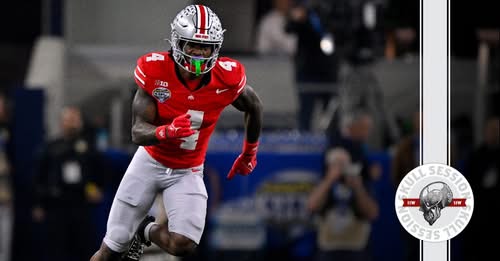That line, “It’s gonna be really fun going against him because he’s a freak of nature,” from Texas defensive back Michael Taaffe, is more than just a pre-season soundbite. It’s a statement that encapsulates the essence of what makes college football so captivating. It speaks to the intense, personal rivalries forged on the field, the grudging respect between competitors, and the sheer, awe-inspiring athleticism that defines the sport’s elite players. Taaffe’s words were directed at his own teammate, running back CJ Baxter, during fall camp, but they could just as easily apply to a fierce rival from another school. This sentiment—the excitement of facing an exceptional talent, the challenge of trying to stop a force of nature—is a universal truth in sports. It’s the drive that pushes athletes to their limits and creates the moments fans remember for a lifetime.
When a player like Taaffe, a seasoned defensive back, uses the term “freak of nature,” it’s not an exaggeration. It’s a genuine acknowledgment of a physical and athletic phenomenon. These are the players who defy conventional expectations. They possess a blend of speed, power, agility, and instincts that seems almost unfair. Think of a linebacker with the speed of a wide receiver, a running back with the power of a defensive lineman, or a defensive back with the leaping ability of a basketball star. These are the athletes who force coaches to tear up their game plans and make their opponents question their own abilities. For Taaffe, going against a player like Baxter in practice is the ultimate crucible. It’s a chance to hone his skills against a top-tier talent without the pressure of a game day crowd. The repetitive drills, the one-on-one matchups, and the constant competition sharpen his instincts and improve his technique. He knows that if he can hold his own against a “freak of nature” like Baxter, he’ll be more than ready for any opponent he faces on Saturdays.
This internal competition, the daily battle between teammates, is the engine that drives a successful program. Iron sharpens iron. When the best players are constantly pushing each other, the entire team benefits. The offensive line learns to handle a blitz from an otherworldly defensive end, the wide receivers learn to shake a lockdown cornerback, and the quarterbacks learn to read defenses against a secondary that knows all their tendencies. This isn’t about animosity; it’s about a shared commitment to excellence. Teammates may be rivals in practice, but they are a unified force on game day. The respect is inherent. Taaffe’s comment isn’t just about Baxter’s physical gifts; it’s also about his work ethic and determination. You don’t become a “freak of nature” without countless hours in the weight room, on the practice field, and in the film room. The talent is a starting point, but the dedication is what separates the great from the truly elite.
The phrase also speaks to the pure joy of the game. For all the pressure, the grueling training, and the high stakes, athletes like Taaffe and Baxter are driven by a fundamental love for competition. The opportunity to test their skills against another exceptional athlete is, for them, the definition of fun. It’s the reason they put on the pads every day. This kind of competitive spirit is contagious. It permeates the locker room and motivates the entire team. A comment like Taaffe’s can be a rallying cry, a reminder of the incredible talent within their own ranks. It builds confidence and fosters a sense of collective belief. When a team knows it has players who are a nightmare to defend, they play with a different level of swagger and intensity.
This dynamic also provides a window into the mind of a defensive player. Defensive backs, in particular, have a unique perspective. They are often tasked with guarding the most athletic players on the opposing team—the speedy wide receivers, the elusive running backs, and the agile tight ends. Their job is a constant chess match, a physical and mental battle that requires split-second decisions and perfect technique. For a defensive back, the term “freak of nature” is a compliment of the highest order. It means the challenge is immense, but the reward—making a play against such a talent—is even greater. It’s the ultimate test of their skills, a moment where they can prove their worth. The “fun” Taaffe speaks of is the thrill of that challenge, the satisfaction of a well-executed tackle or a perfectly timed pass breakup against a player who, on paper, should be unstoppable.
The culture of respect in college football is often overlooked, but it’s a critical component of the sport’s appeal. While rivalries can be heated and trash talk is part of the game, there is a deep-seated respect between players who understand the sacrifices and the dedication required to compete at that level. Taaffe’s comment is a perfect example of this. He’s not belittling Baxter; he’s celebrating his talent. He’s acknowledging that he will have to bring his absolute best to the practice field every single day just to keep up. This mutual respect creates a fertile ground for growth and development, not just for the players involved, but for the entire team. It’s a reminder that even in a highly competitive environment, there can be a sense of camaraderie and shared purpose.
Ultimately, Taaffe’s quote is a simple but profound insight into the mind of an athlete. It’s a testament to the passion, the drive, and the sheer joy that fuels the game of football. It’s a recognition that the true measure of an athlete isn’t just in their statistics, but in the respect they command from their opponents and, in this case, their teammates. The “freaks of nature” are the ones who make the game special, who create the highlight-reel moments and the legendary matchups. But the players who are willing to go up against them every day, who embrace the challenge and find the “fun” in the struggle, are the ones who truly embody the spirit of the sport. They are the ones who make college football a source of endless fascination and excitement. Without these athletes, pushing each other to new heights, the game wouldn’t be the same. The thrill of competition, the respect between rivals, and the awe-inspiring athleticism of the players—it’s all captured in that one simple, yet powerful, sentence. It’s why we watch, and it’s why they play.



